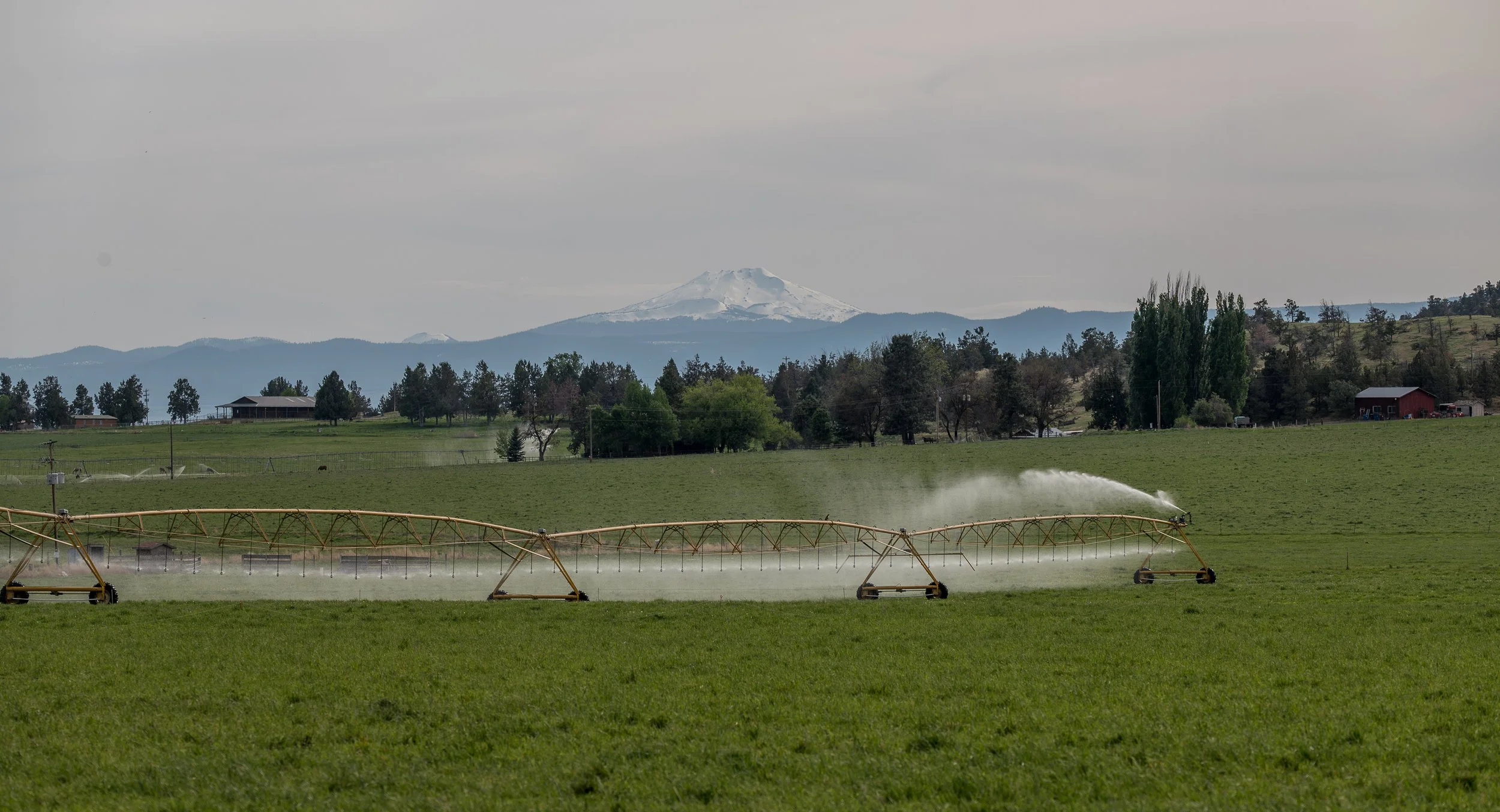Capitol Gains: Oregon’s 2025 Legislative Session Unpacked
What passed, what stalled, and what’s next
Oregon Capitol Building in Salem.
Simply put, Oregon’s 2025 legislative session was a doozy. Six months of nonstop bill tracking, analysis, advocacy, and collaboration kept the entire LandWatch team busier than ever and on our toes every step of the way. It was well worth the effort, though, and now, the session is wrapped, so it’s time to take a look back at everything that transpired.
Overall, LandWatch managed to defeat serious legislative threats and advance key policies that will protect Central Oregon’s landscapes, waterways, and communities. As with any statewide policymaking opportunity, there were many cooks in the Capitol kitchen. Naturally, some of our legislative darlings fared better than others. To be frank, it was downright frustrating at times for LandWatch and many other environmental interests (more on that below).
But we were also pleased to see many priority bills prevail thanks to broad-based coalition efforts and sustained advocacy from Oregonians like you.
Working for Wildlife
Mule Deer does in Central Oregon sagebrush. | Jon Nelson
LandWatch went into this year’s legislative session intent on securing meaningful policy improvements and investments to better protect the habitat and wellbeing of our iconic wildlife.
Let’s start with a win
House Bill 2978 was signed into law early in the session. This bill strengthens guidelines for collaboration, training, and transportation to enhance highway safety and promote wildlife passage. It builds upon past progress at the legislature and is a meaningful step forward for both people and animals on the move.
The fight for funding continues
Despite broad bipartisan support from legislators and Oregonians across the state, House Bill 2977—which aimed to deliver significant funding resources for wildlife conservation work—was blocked in the waning hours of the session thanks to a bit of last-minute legislative obstructionism from two Republican senators (ahem, Daniel Bonham and Cedric Hayden 👀).
LandWatchers showed up for HB 2977, and although this bill didn’t make it over the finish line this year, we’re confident that the foundation of support we built alongside wildlife conservation interests across the state will continue to push for funding resources and capitalize on future legislative opportunities.
A Transformative Water Tool for Central Oregon
Upper Deschutes River at low flow due to irrigation storage during winter. | Matt Oliphant
Delivering solutions to restore instream flows and support food-producing farms in Central Oregon was another top priority for LandWatch this year.
Deschutes Basin water users have long needed easier ways to share water with those who need it most, including by leaving flows instream to support fish and wildlife. In response to this long-standing need, House Bill 3806 was developed to establish a pilot water bank program in the Deschutes Basin.
We’re excited to share that HB 3806 passed during the session! This legislation will provide a framework to help scale market-based tools in the basin, more equitably distributing our precious water resources to better serve our high desert communities and watershed.
The next step is to "fill" the bank with freshwater from water rights holders eager to voluntarily participate in this exciting new program. Our partners at the Deschutes River Conservancy will manage the operation of the pilot water bank in accordance with state requirements and in cooperation with participants. Stay tuned for updates on this new water tool!
Waterworld
Irrigated agricultural land in Deschutes County. | Matt Oliphant
Water proved to be a hot topic this session, covering a broad array of issues and challenges across the state. Unfortunately, several important water bills that LandWatch supported did not advance this session.
Currently, changes to existing water rights do not need to consider stream flow impacts. Senate Bill 1153 would have required the state to consider potential stream flow impacts during the water right transfer process.
You can’t manage what you can't measure. Both House Bill 3418 and House Bill 3343 would have improved the state’s ability to require measurement and reporting of water use across the state.
LandWatch also worked on several legislative concepts aimed at reducing water waste and improving our water supplies in the Deschutes Basin to better meet agricultural, environmental and municipal needs into the future, including how to better match water deliveries to crop water requirements.
While these bills failed to pass in 2025, we look forward to continuing to explore these topics during future legislative sessions.
All About Housing
Expanding middle housing options is key to solving Oregon’s housing shortage.
In pursuit of climate-resilient, complete communities, we had our sights set on funding infrastructure for affordable housing and lowering the hurdles that are unique to creating “middle” housing.
In many ways, the focus of the 2025 session centered around legislative solutions to housing production. With the dust now settled, we’re pleased to report that LandWatch’s priority housing bills fared reasonably well. Here’s the lowdown on six that passed:
House Bill 3031 establishes a state-level infrastructure funding program specifically for producing more affordable housing, and Senate Bill 5531 authorizes the issuance of $10M in lottery bonds to fund the program created through HB 303. While that amount is far less than the $100M we advocated for, the establishment and initial funding still represent a meaningful step in the right direction and will make it possible to build more affordable and abundant housing in our communities where we have planned for it.
House Bill 2138 will boost infill and ease restrictions on necessary middle housing options, such as duplexes, triplexes, cottage clusters, and accessory dwellings.
House Bill 3145 advances innovative housing types, such as modular and mass timber, that enable more diverse housing options to be sited and built quickly and at lower costs.
Senate Bill 51 will provide funding to support affordable housing property management services and create a program to preserve existing affordable housing.
Senate Bill 48 delivered several important technical fixes to a piece of legislation from last year (SB 1537) to uphold its intent to more quickly and efficiently deliver needed housing within UGBs—and not on lands outside of UGBs.
The Transportation Package That Could’ve Been
Perhaps the biggest letdown of the 2025 session: the legislature adjourned without passing any transportation funding bill, good or bad.
Throughout the session, we helped shape this transportation bill—House Bill 2025—as part of the Move Oregon Forward coalition and the Oregon Wildlife Coalition. We advocated for a balanced package that robustly funds safe, accessible, and affordable transportation choices (think transit, biking, walking, and rolling, as well as driving) for all Oregonians.
While this isn’t the outcome we worked so hard for, it’s not entirely surprising, either. To address this gap, Gov. Kotek has hinted at the potential to convene a special legislative session with a transportation focus in the months ahead.
It’s disappointing to see this bill fall flat after all of the dedicated and collaborative efforts that went into it, but the work continues. Whatever it takes and whenever it happens, we’re ready to help shape Oregon’s next transportation bill and advocate for a balanced package that robustly funds safe, accessible, and affordable transportation choices for all Oregonians.
The Fight for Farm & Forest Lands
Agricultural land in Deschutes County. | Bob Pool
Protecting Oregon’s irreplaceable agricultural and forest lands from being lost to private development interests is a perennial focus for LandWatch..
We’ve seen growing interest in Salem to roll back land use protections, potentially opening the door for increased rural sprawl on farm and forest lands. Throughout the 2025 session, we successfully countered a wave of bills that would have weakened these important protections:
Late in the session, LandWatch, our community, and land use advocates from across the state have stopped a dangerous bill—House Bill 3858—in its tracks, even after it passed out of the House of Representatives. This bill threatened to weaken farm and forest protections statewide by creating a new, confusing land category that could have opened the floodgates to unchecked development. This is a quiet win with a big impact. Not every threat makes headlines, but stopping them early is how we protect what matters most.
We also helped ensure that two other proposed bills, Senate Bill 878 and Senate Bill 438, which would have allowed fragmentation of working farmlands, didn’t make it any further than their initial hearing.
Thanks to the advocacy of our powerful community of LandWatch supporters, these significant threats were halted—and we’ll continue to work throughout the year to ensure that any remaining threats don’t advance in future sessions.
Maybe next time
Notably, legislation to end spot zoning—Senate Bill 73—was introduced on LandWatch’s behalf this session.
While that bill didn’t move forward, its introduction raised awareness of the need to preserve rural working farms and forests while planning for efficient and climate-friendly future urban growth boundary expansions.
Advancing Your Interests At Every Level
Central Oregon’s remarkable livability is no accident—it’s by design.
That recaps some of LandWatch’s priority bills from 2025—but there were many other bills that we also supported or countered. All told, our staff weighed in on more than 40 bills and tracked 330 bills!
This level of attention would not be possible without the generous support of our members, so thank you for fueling this vital work. We take our responsibility to advocate for your interests seriously.
This year, we saw great engagement from our community! We deeply appreciate the time and energy that so many LandWatch members spent writing to their legislators to help the best ideas progress and the worst proposals disappear. We tried to make the process as easy as we could for people, and it was wonderful to see more folks than ever getting engaged in writing comments. Here’s what one advocate had to say about his experience:
“I have always had trouble keeping up with the state legislature. I want to provide testimony and send letters to my legislators about bills they're going to vote on. But, when they are in session, they move fast and it is easy to miss the right time to comment. This year, Central Oregon LandWatch made it simple. Their alerts came at the right times and included summaries of what was going on and clear talking points I could use to frame my comments. I felt, for the first time, that I was engaged with the legislature and contributing constructively about the issues I care about.” - David G., LandWatch member
Central Oregon LandWatch takes an “all lands, all levels” approach—advocating for livability and environmental safeguards in city council chambers, county planning departments, the Oregon State Legislature, and federal policymaking. Bringing expertise, passion, and tenacity, we are committed to ensuring that decisions at every level reflect the long-term needs and desires of the LandWatch community, while protecting the unique character and ecological significance of this region.












